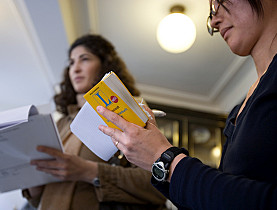Concern raised over citizenship “obstacle”

A move by Bern to become the first Swiss canton to make citizenship courses compulsory for naturalisation applicants has come under fire from a migration watchdog.
While proponents say the courses will help integration, the Federal Commission for Migration Issues says they could become an obstacle to citizenship applicants, rather than an aid.
The courses are already mandatory in many parts of canton Bern, but under a decision by the cantonal government every district will have to offer the courses from January 1, 2010 and naturalisation applicants must take part.
Under a separate provision of the law also coming into force, anyone applying for citizenship will also need to attain a basic level in French or German.
Philippe Messerli, one of two politicians behind the initiative, says the goal of citizenship classes is to inform and prepare people for the naturalisation process by giving them an understanding of Swiss society and laws.
“Sometimes they come from countries that have a completely different culture. Even for Italians or Germans it is another system, with federalism and direct democracy, all these aspects are a bit different from other countries,” he told swissinfo.ch.
“Another aspect is that things are done the same way across the canton. Before some communes did it and some didn’t. That’s a bit unsettling. It is to have some unity.”
At forefront
Angela Cadonau, of Bern cantonal migration office, agrees.
“Various municipalities in the canton of Bern already require citizenship courses. This will provide a legal foundation by which the naturalisation process in the canton of Bern can be standardised,” she said, adding that the move would also boost integration.
In Switzerland, cantonal and local authorities are responsible for naturalisation procedures. Applicants must show during an interview that they are integrated into Swiss society.
Research in 2008 among the nine most populated Swiss cantons found that only two – Ticino and Solothurn – foresaw providing citizenship courses at a cantonal level. Since then several others have also started making moves in this direction. But Bern is the first to bring it into force.
Slap in face
The Federal Commission for Migration Issues believes the new courses should not become another layer in the citizenship process, but instead replace the standard citizenship interview.
“If a person was seen to be integrated once they followed the citizenship and language courses and they were not examined any further after that, there is naturally an advantage [to the courses],” the commission’s Pascale Steiner told swissinfo.ch.
“For these people naturalisation is also a sort of recognition. They live here, they work here, they pay taxes, and to give them citizenship is also a form of recognition for what they have done for this society. To add even more obstacles for them is like a slap in the face.”
Steiner noted that in 2006, the commission had described compulsory language tests as an extra hurdle that complicated the naturalisation process. The same could be said for mandatory citizenship classes, she said.
The commission says naturalisation is not a final stage or “crowning” for immigrants but a factor that promotes their integration into society. Language skills are not proof of an advanced stage of integration, it argues.
The Swiss Refugee Council backed citizenship courses in principle, saying they promote successful integration and equal treatment of candidates. But it noted that the courses planned by canton Bern seemed a little long – applicants must follow up to 18 classes – and the content requirements excessive.
It recommends that districts in canton Bern be aware of candidates’ different situations and suggests that such courses be covered by compensation from employers.
Help prepare
Daniel Arn Bernischer, who is in a working group to create a course template for canton Bern, argued the aim was to help applicants.
“Before being naturalised, you have a meeting with representatives and they ask you, for example, who heads the finance ministry, are there any problems with Libya. You have to be up-to-date and for that, we want to prepare people for this meeting,” he said.
Messerli added that the aim was not to make applicants’ lives more difficult.
“In the commune where I am from they have already been offering these courses for two years. The participants are very happy with it and say they learn a lot about Switzerland. I have not heard any criticism of it.”
“If someone does not want to do these courses, if they don’t want to know how our system works, I do not know why they want to become Swiss. We don’t want to bother people or burden them. But a minimum standard is needed before someone is naturalised.”
Jessica Dacey, swissinfo.ch
Citizenship applications are decided by town hall assemblies or special committees.
Local authorities in 18 out of the country’s 26 cantons regularly hold public meetings to decide on citizenship applications.
In 2003 the Federal Court banned secret ballot box decisions, following a series of allegedly racially motivated rejections of naturalisation requests.
Up to 90 communes – out of 2,800 nationwide – used the ballot box method before it was outlawed.
In August 2007 the government announced more than 40 wide-ranging measures to improve the integration of foreigners, with languages and education taking centre stage.
Foreign residents must wait at least 12 years to be eligible to apply for citizenship.
Naturalisation proceeds in three stages. Swiss citizenship is only acquired by those applicants who, after obtaining the federal naturalisation permit, have also been naturalised by their communities and cantons.
Foreigners married to Swiss nationals can avail of a simplified procedure, reducing the number of years they have to wait.
Applicants must show that they are integrated into Swiss society, comply with Swiss law and pose no threat to internal or external security.
In 2008, 45,305 applications were accepted, more than twice as many as ten years before. Foreign residents account for more than 20% of the population. One in four are Swiss-born.
Courses are currently run by schools and non-profit organisations.
Courses will include a maximum of 18 lessons. The cost is borne by the applicant and is estimated to average around SFr400 ($396).
Content of the courses is left up to the municipal authority. But a working group has been created to try and harmonise the courses so every municipality does not have to come up with a new course.
The goal is to increase the general knowledge of Switzerland.

In compliance with the JTI standards
More: SWI swissinfo.ch certified by the Journalism Trust Initiative













You can find an overview of ongoing debates with our journalists here . Please join us!
If you want to start a conversation about a topic raised in this article or want to report factual errors, email us at english@swissinfo.ch.